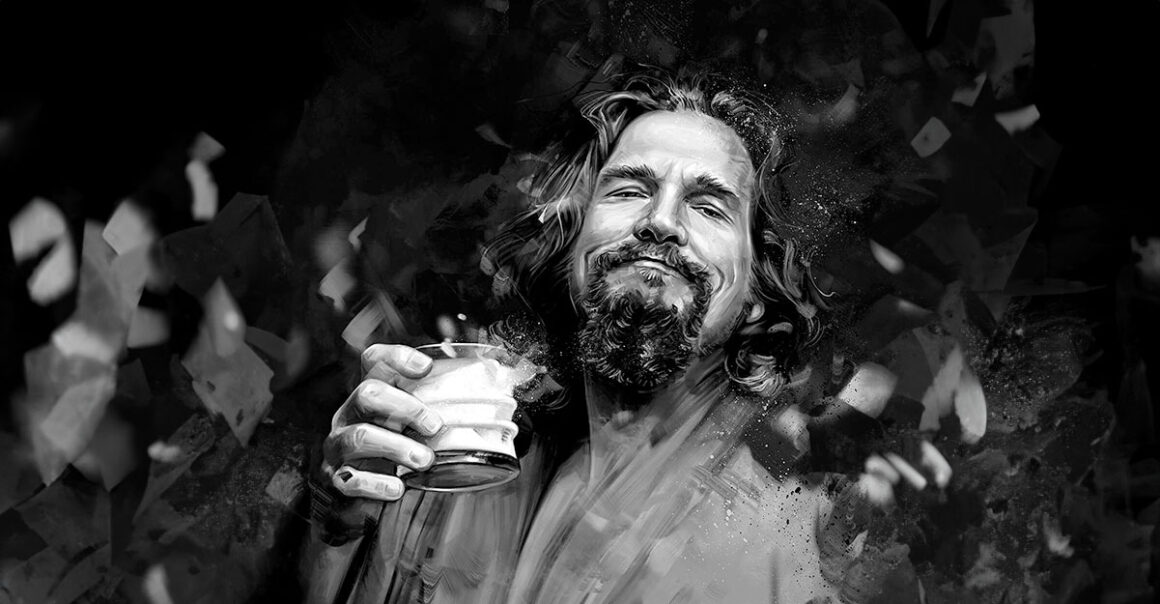Tao abides in non-action,
Yet nothing is left undone.
-Lao Tzu, Tao Te Ching, Chapter 37
“You’re Mister Lebowski, I’m The Dude.”
There are few characters who embody a laid-back philosophical vibe as effortlessly, as Jeffrey Lebowski, affectionately known as “The Dude.” The cult favorite film The Big Lebowski by the Coen Brothers is renowned for its story and unique humor. Yet beneath its surface lies a connection to Zen and the Taoist philosophy.
“Woo peed on my rug.”
At the heart of Taoism, as depicted in the Tao Te Ching, lies the concept of “Wu Wei”. A concept, which translates to “non action” or maybe more accurately as “effortless action.” This isn’t about being lazy and spending hours watching TV. Rather it is about harmonizing with the rhythm of life and avoiding unnecessary resistance. It is about balance and flow. The Dude epitomizes this philosophy when he is in his Zen-like default state. He deals with the absurdities thrown his way, as we all do, but ultimately, he returns to his natural flow. For most film narratives there is usually an arc the characters go through. The Dude, however, never really goes through any kind of transformative arc. The Dude is the same where he started as where he leaves us. He’s taking it easy with a couple of wheat sodas and a bowling ball.
“Fuck it Dude, let’s go bowling.”
According to Alan Watts’ book The Way of Zen, genuine Zen practice involves living in the moment. A practice that challenges us to embrace life’s unpredictability. It informs us the danger of trying to exert our power over others and trying to control every situation. Watts says, “When we attempt to exercise power or control over someone else, we cannot avoid giving that person the very same power or control over us.” In this way The Dude of course reacts to an absurdity when it arises, but never lets it ultimately affect his way of life or who he is as The Dude. His ritualistic lifestyle includes the joys of bowling, sipping a White Russian, smoking a j, and enjoying a bath while listening to Song of the Whale. His carefree attitude towards norms and his refusal to participate in the hustle reflects the wisdom of Watts. He states, “To the Taoist mentality, the aimless, empty life does not suggest anything depressing. On the contrary, it suggests the freedom of clouds and mountain streams, wandering nowhere, of flowers in impenetrable canyons, beautiful for no one to see, and of the ocean surf forever washing the sand, to no end.” Reflecting this statement The Dude is akin to a Taoist sage, albeit one dressed in a bathrobe and Jesus jellies.
“Yeah, well, that’s just like your opinion man.”
Then you have D.T. Suzuki’s book Zen and Japanese Culture, which delves into Zen principles and the idea of finding peace through inner reflection and the ordinary of everyday life. Flow and meditation highlights several particular moments in the film. The Dude can be seen meditating on his newly acquired rug from the big Lebowski while listening to bowling sounds. He can be seen balancing on the rug as if doing some kind of yogic movement. He can also be seen in his bath tub listening to Song of the Whale. Similarly, the intro montage of patrons bowling, is shown in a meditative almost serene like way. It is this kind of peace and enlightenment through the ordinary which D.T Suzuki talked about. He says, “The truth of Zen, just a little bit of it, is what turns one’s humdrum life, a life of monotonous, uninspiring commonplaceness, into one of art, full of genuine inner creativity”. and when he states “Who would then deny that when I am sipping tea in my tearoom I am swallowing the whole universe with it and that this very moment of my lifting the bowl to my lips is eternity itself transcending time and space?” Likewise, who would deny that when The Dude is sipping a White Russian on his rug that he is not swallowing the whole universe? Certainly not I.
“Hmm. That some kind of Eastern thing?”
At glance The Big Lebowski may seem like a comedic crime story. However it also serves as a philosophical discourse cleverly intertwined within its narrative – much like a rug that ties everything together in a room. The movie encourages viewers to contemplate on themes such as, the essence of existence, the futility of ambition for power and money, and finding peace amidst lifes chaos. Looking at The Dude from a Taoist perspective he’s not just a slacker. He represents a wise figure playfully poking fun at a society overly focused on control and achievement.
“The Dude abides.”
So, the next time you find yourself watching The Big Lebowski take a moment to notice the Taoist ideas subtly threaded throughout the story. The ups and downs, the strikes and gutters, they all serve The Dudes journey as a nod that sometimes the best approach to lifes complexities is to find the flow and go with it. To be honest amidst our lives we could all benefit from embracing some of The Dudes laid back vibes.
Conclusion
While The Dude may be fictional his relaxed wisdom offers Zen and Taoist lessons on finding peace and acceptance in an absurd reality hell-bent on control. In a world of chaos and discord perhaps we could all learn something from embodying more of The Dudes Zen essence. And just as The Dude abides, so can you.
Reading List
Tao Te Ching by Lao Tzu
The Way of Zen by Alan Watts
Zen and Japanese Culture by D.T. Suzuki









